Entries from March 1, 2013 - March 31, 2013
Now Japan and EU start talks on free trade deal
 Thursday, March 28, 2013 at 8:17AM
Thursday, March 28, 2013 at 8:17AM FT story.
Comes right on the heels of recent talks with US to consider starting similar negotiations.
This is the West not waiting on the WTO, which is good.
It's also the West recognizing collective strengths, which is also good.
That's the funny thing about trade pacts - they tend to come when times are bad.
Because, when times are good, everyone's too picky and demanding. But when times are bad, and everyone assumes trade protectionism will rule, wiser heads prevail.
This is old-school globalization (1945-1980), and it's good to see that it's still capable of moving the ball forward.
We need to talk about Egypt
 Wednesday, March 27, 2013 at 12:46AM
Wednesday, March 27, 2013 at 12:46AM  Nice piece by Roula Khala in the FT on the unfolding crisis that is Egypt’s economy. To no one’s surprise, the Muslim Brotherhood has proven rather inept at economic management – much less reform. One can hope that the learning curve, while steep, is rapidly surmounted, but there’s always the temptation of long, out-of-power revolutionary types to imagine that “now is our time to prove there is an [INSERT NATIONALITY HERE] way of doing things!”
Nice piece by Roula Khala in the FT on the unfolding crisis that is Egypt’s economy. To no one’s surprise, the Muslim Brotherhood has proven rather inept at economic management – much less reform. One can hope that the learning curve, while steep, is rapidly surmounted, but there’s always the temptation of long, out-of-power revolutionary types to imagine that “now is our time to prove there is an [INSERT NATIONALITY HERE] way of doing things!”
Over time, genuine economic development forces convergence: there are a few models out there (centralized socialism, oligarchic capitalism, state-run capitalism, big-firm capitalism and entrepreneurial capitalism) and there are pathways from one to the other (e.g., Russia from centralized socialism to oligarchic capitalism, China from centralized socialism to state-run capitalism, Japan from state-run capitalism to big-firm capitalism, Singapore from state-run capitalism to entrepreneurial capitalism, America from big-firm capitalism to a hybrid of that + entrepreneurial capitalism (i.e., industry sectors dominated by a handful of go-to-market options, surrounded by a sea of entrepreneurial small firms)). But everyone ends up running the same pathways – to wit, state-run China dreams of achieving its own Goldilock-style mature capitalism by “going global” in the direction of big-firm capitalism, pursuing “indigenous innovation” in the direction of entrepreneurial capitalism, and splitting the difference with domestic-led consumption (basically, the US model).
So no, there isn’t anything new under the sun; there’s just the same old game of hopscotch.
The fundamental flaw of the MB in power to date, according to Khalaf:
Mr Morse, an Islamist, has yet to understand that politics and the economy cannot be managed separately. A lack of political consensus is destroying his chances of taking difficult austerity measures, including cutting a costly subsidies bill and raising taxes, all of which are required by the IMF.
The IMF only matters here because of a $5B loan agreement on the table. Yes, Mr. Morsi can try to sell Egypt to China for a similar amount, but there he might find that the new neo-colonialism practiced by Beijing (you sell us raw materials and we sell you finished goods) isn’t the great liberation it’s made out to be for a country with such massive underemployment (and no serious material wealth). It’s hard to follow the China model unless you’re China, which means it’s not really a model at all.
Khalaf preaches an IMF programme (oops, went Brit there for a few strokes) “accompanied by substantial funding from an international support group made up of Western powers and Middle East oil states.
Me? I would hope Egypt might split the difference and go for a bigger international support group that includes rising Eastern economies. Because if it’s just the West and oil-rich sheikhs making demands, that gives Morsi the ideological “out” of resistance. So including China and India et al. in such things would be a nice way of evening out the demands, the message, and sense of us-against-them.
What China wants, China gets - at a cost to the planet
 Tuesday, March 26, 2013 at 12:01AM
Tuesday, March 26, 2013 at 12:01AM  One of the ways in which China starts getting blamed for all things globalization is the direct impact its consumers can have on global markets - sending them soaring and crashing in a historical heartbeat.
One of the ways in which China starts getting blamed for all things globalization is the direct impact its consumers can have on global markets - sending them soaring and crashing in a historical heartbeat.
I've talked about China's incredible hunger for various nuts in the past, and how that demand has fundamentally reshaped ag markets in the US.
This NYT story discusses how fishermen off the coast of Mexico are ignoring governmental attempts to preserve an overfished area for sea cucumbers. Out-of-area guys are slipping into zones being vigilantly guarded by locals and pulling out hauls right under their noses. This creates a "wild west" atmosphere were towns square off against towns over their precious slices of the pie and every stranger is treated like a would-be criminal.
Until China emerged in its middle-class glory, they wasn't much of a demand, as sea cucumbers aren't really eaten by Mexicans. But now the demand is such that one guy poaching can claim $700 a day in profit.
So this section of Mexico's coastline is in uproar . . . because Chinese like their sea cucumbers.
There will come a time - soon enough, when virtually everyone in the world who isn't Chinese will be living some version of this story.
A while back, America played that role, and while everyone wanted to please that American consumer, the dynamic created a lot of antipathy too.
And that is what's coming toward China at high speed.
 China,
China,  Mexico,
Mexico,  US,
US,  development,
development,  globalization | in
globalization | in  Citation Post |
Citation Post |  Email Article |
Email Article |  Permalink |
Permalink |  Print Article
Print Article Iraq at ten years
 Monday, March 25, 2013 at 12:35PM
Monday, March 25, 2013 at 12:35PM 
Cartoon found here (in an FT op-ed that fits this post nicely - if orthogonally).
Read through a variety of the tenth-year anniversary reviews, and I thought Thomas Friedman's was the best - despite the weird title (Democrats, Dragons or Drones?).
His basic notion that it takes the next generation to create and shape the subsequent reality is correct. Friedman pegs it at "9 months and 21 years to develop."
Fair enough. But the question (as he also notes) hinges on that generation's journey. Done well, it works. Done badly enough and a vicious spiral ensues. In truth, the jury remains out on that score.
We won the war - no doubt, and then took a pass on the postwar. If we hadn't, then questions of "why?" fade away. In the post-9/11 mood, America possessed the desire to reshape the region and Saddam was the obvious target. Direct causality was not the issue, although Dick Cheney tried to sell that. Nor was direct threat, referring to the late and frantic oversell of the WMD to Congress. The purpose - all along - was structural retribution: as in, you reshaped our world, now we reshape yours. Americans are just deeply uncomfortable admitting that, so we needed a clear and present storyline to drive our revenge-flick dynamics.
The resulting strategic "pre-emption" was oddly symmetrical in ambition but certainly not in cost (and why should it be so between a superpower and a non-state actor?).
So when we take that pass on the aftermath of the war, and basically pretend that what comes next doesn't really matter, we abort the entire regional restructuring ambition (which, if you remember, was on a nice roll for 2-3 years there) and we allow ourselves to be swallowed up (in terms of strategic effort and attention) by an insurgency that was completely foreseeable and completely manageable - if we had bothered to embrace that inevitability.
But instead of embracing it, we did what we always do and called the postwar another war. And wars yield a singular answer in US military history - called, more firepower. And then we found that made things worse (go figure).
And then the White House, chastened finally by the 2006 midterms, relabeled the conflict and rebranded the mission - and then we succeeded again.
But by then the public narrative had already been cast (Bush lied, too many deaths, too much cost).
So ultimately the Bush administration pays the legacy cost for its mistakes, which mostly had to do with stubbornness. They had their narrative of a successful war and stuck to it - until it hurt so bad that they had to change.
So what are we left with?
In structural terms, I like what the Middle East has become. The inevitabilities are being processed and Iran is more isolated than ever. And thanks to larger structural changes in the global economy, the area is coming under new superpower management - inexorably. None of it is nice, but it was never going to be anything but painful and violent. The Arab world has an enormous amount of catching up to do WRT globalization, and it will be awful in execution (and with Africa leaping ahead on many fronts, the Middle East and North Africa - or large portions of it - risk becoming globalization's long-term basket case).
If the US had handed off the region still encased in its many dictatorships, China would have a much easier time over the next two decades. Now, it faces challenges that are likely to alter its own political structure significantly - just like it did to the US. Some naturally see the "defeat of American empire" in the region, but since empire was never America's goal, that judgment is meaningless.
All that matters is the relative evolutions of the three superpowers of the 21st century: China, India and America.
America did, per my original Esquire piece, take strategic ownership of the Middle East in a big way. That ambition was both debilitating and liberating: we took our shot (badly) and now we're done "owning" things there (besides Iran's nukes). In that way, Iraq processed our inevitable post-9/11 over-reaching response (we are a democracy) and hurried us along the exhaustion-collapse-rock bottom-recovery-resurrection dynamic that was always slated for us in the post-Cold War world (our inability to handle the success of the "end of history" - aka, the globalization of our economic connectivity model). We had gotten used to running things, and we weren't going to stop until something made us stop - an unpleasant journey but a necesssary one.
Now, in grand structural terms, the race among my C-I-A trio is well underway. The Obama administration, needing a switch-over target, sells its Asian pivot. This is not a good answer, as I have noted frequently - but rather a red herring. The real struggle in Asia doesn't involve us except in an off-shore balancing role.
Instead, the real struggles of the future involve the very same frontier integration I've been talking about for a decade now. On that score, we are looking fine enough in our ongoing restructuring of our portfolio, while China's grows frighteningly larger relative to its ability to deliver and manage regions distant from its shores. India is just begining to recognize what responsibilities lie ahead.
You'll say that China will do it differently, but the structure of the system will force the same responses: China cannot afford to lose its growing overseas dependencies (much greater than any borne by the US), and so the responses will be mounted. And when they don't go well (whoever gets it right - right off the bat?), change will double back upon China - to its general benefit (along with the world's).
Iraq was always a means to an end (when in history has great power war ever been anything else?). During the real-time execution, it seems like everything - as does every war throughout history. But half a century later? It looks very different. It's a stepping stone for superpowers: some step up and some step down, some step away and some step in. None of it is exactly what it appears to be in the light of present-day reporting. Per Zhou Enlai's take on the French Revolution, we will be witnessing the downstream consequences across the century.
 China,
China,  India,
India,  Iraq,
Iraq,  Middle East,
Middle East,  US,
US,  globalization | in
globalization | in  Citation Post |
Citation Post |  Email Article |
Email Article |  Permalink |
Permalink |  Print Article
Print Article The pollution trigger in China
 Friday, March 22, 2013 at 8:50AM
Friday, March 22, 2013 at 8:50AM 
I love that building. Locals in Beijing have dubbed it the "squatting man" or some such (you get the idea), indicating that the Chinese sense of humor is as fine as anybody else's.
But patience wears thin on the subject of pollution, which is stunning to behold in China - as in, take my allergy issues in Indiana and times it by 10 in terms of the resulting agony.
Here we see the same fundamental failure of authoritarian rule that we saw in the Soviet Union: when the state has unbridled power, it trashes the environment. The Soviets took that sin to amazing depths, but the Chinese are rapidly closing in on those horrific standards.
And yes, democracy is the answer - the only answer. We bitch about the BANANAs and NIMBYs (look 'em up) in the US, but frankly, these cranks do God's work day-in and day-out - along with our legal system. Give me one Erin Brockovitch over a million Maos (or even a hundred Dengs) and we will all live in a much better world.
The strongest grass-roots democratization dynamics inside China involve the environment. Some of the best progressive elements within the US during our similar out-of-control developmental age (late 19th century) were likewise focused (and again, TR leads the way politically). It's the easiest and most direct trigger to the whole "I'm mad as hell and I'm not going to take it anymore" dynamic that fuels democratization. You simply push people too far with your incompetence and indifference.
Yes, the new generation of CCP leaders seems far more aware of the issue - Li Keqiang especially. But as the NYT front-pager today points out, that lofty talk doesn't surmount the bureaucratic infighting within the single-party state. Here is where the lack of an out-of-power party is crucial. No one can sweep in with an electoral mandate to clean things up - hence, nothing significant gets accomplished.
The great dynamic of America's Progressive Era was that parties won big and ruled big, whether they were Dems or Republicans. That's how stuff (new rules) got done and things improved dramatically.
That's also what we lack today with the evenly-and-deeply-divided Boomer-centric electorate - hence our deep need for reforms as well. But at least we have the system in place for when the electorate gets fed-up enought to force action.
China lacks this, and it's getting to be a huge hindrance to its further progress as a nation.
Cyber mischief as the new signaling
 Thursday, March 21, 2013 at 9:22AM
Thursday, March 21, 2013 at 9:22AM  NYT story on cyber attacks on two major SouKo banks - presumably by NorKo.
NYT story on cyber attacks on two major SouKo banks - presumably by NorKo.
I think this becomes the new brinksmanship/signaling in the digital age, meaning it's truly a virtual form of warfare and not a real warfare domain per se. It's easier and more clear than the usual diplo protests.
So we have this as a fifth vein of cyber (offensive/offending).
The five categories, in my mind, are:
- Sheer industrial espionage (see China - on mass scale)
- Sheer spying (done by all - with US long in the lead with NSA, but less so today as others catch up)
- Normal espionage (see Israel v Iran, US's Stuxnet with Israel v Iran, etc.)
- In support of conventional offensive ops (meaning, old-fashioned EW [electronic warfare] updated) - this being the least frequent use because true wars are shorter and less common now.
- Signaling
What I don't see is cyber as a separate offensive warfare category - i.e., that and that alone as THE attack. You use as enabler in traditional attack, or its virtual warfare at best (remember that virtual means "not X").
That's why I don't find cyberwarfare so novel or weird or supremely trumping as some do. It's just a lot of old modalities updated and augmented - nothing more.
American withdrawal: this time it is different
 Wednesday, March 20, 2013 at 9:32AM
Wednesday, March 20, 2013 at 9:32AM 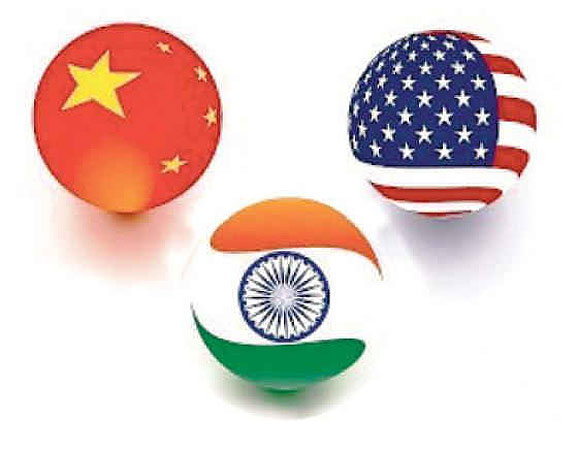
Eliot Cohen sounding very scared in the WSJ:
The arguments against far-flung American strategic commitments take many forms. So-called foreign policy realists, particularly in the academic world, believe that the competing interests of states tend automatically toward balance and require no statesmanlike action by the U.S. To them, the old language of force in international politics has become as obsolete as that of the "code duello," which regulated individual honor fights through the early 19th century. We hear that international institutions and agreements can replace national strength. It is also said—covertly but significantly—that the U.S. is too dumb and inept to play the role of security guarantor.
Perhaps the clever political scientists, complacent humanists, Spenglerian declinists, right and left neo-isolationists, and simple doubters that the U.S. can do anything right are correct. Perhaps the president should concentrate on nation-building at home while pressing abroad only for climate-change agreements, nuclear disarmament and an unfettered right to pick off bad guys (including Americans) as he sees fit.
But if history is any guide, foreign policy as a political-science field experiment or what-me-worryism will yield some ugly results. Syria is a harbinger of things to come. In that case, the dislocation, torture and death have first afflicted the locals. But it will not end there, as incidents on Syria's borders and rumors of the movement of chemical weapons suggest.
A world in which the U.S. abnegates its leadership will be a world of unrestricted self-help in which China sets the rules of politics and trade in Asia, mayhem and chaos is the order of the day in the Middle East, and timidity and appeasement paralyze the free European states. A world, in short, where the strong do what they will, the weak suffer what they must, and those with an option hurry up and get nuclear weapons.
Not a pleasant thought.
But the point I would make is, this time history isn't a guide.
During WWII, the US made the conscious decision to seek to remake the world in its rule-set image, and it succeeded beyond its wildest dreams in the phenomenon we now label globalization. That process was most definitely undergirded by a US security guarantee, which we generally provided to a wonderful degree with definite lapses in execution and - almost as importantly - explanation.
Now we live in a different world thanks to that world-reshaping effort. Plenty of European powers had their shot at this brass ring, and those eras all ended in large scale warfare and decimation of both conquered and conquering.
But notice how the world now enjoys more wealth-creation and order and peace than ever before in history. This is no coincidence. People will claim all sorts of meaningless variables (like the UN - a true laugher if ever there was one), but the reality remains: the US showed up, took charge, and we got this world.
But the success we experienced in this amazing venture (the greatest gift any power has ever given this planet and humanity) means we enter new territory. So no, history isn't any guide. What we do now in some measure of withdrawal is highly unlikely to unleash the tide of misery that Cohen predicts. We've simply incentivized too much of humanity in preserving this global system, meaning it is self-maintaining on many levels (easy to join and hard to upset, as they say).
So why do experts like Cohen keep putting it in such Manichean terms?
We got used to thinking of ourselves as the savior of the world, but that's a been there, done that dynamic now. We came, we saw, we rearranged the rules. Now the system does just fine on its own - for the most part.
Yes, put the world economy in extreme crisis like 2008 and Obama's role suddenly looms incredibly large. Honestly, I think he deserved the Nobel for that - simply doing his best to defeat the widespread expectation that the worst global economic crisis since the Great Depression would result in massive instability and warfare - none of which appeared (proving the realists antiquated yet again).
So what do we do now?
We learn to manage the world with the risers - plain and simple. They have the money and the need and the fear and the willingess to kill to protect their interests. In normal terms, those attributes = a genuine ally versus the free-loaders.
The two key players going forward are China and India. America needs to work that trilateral-global-order-in-the-making. Everything else is ancillary - remembering my recent admonitions that positive co-evolution on progressivism is the way to go on the transatlantic relationship.
But our experts and leaders still have light years to travel on such understanding. We still imagine it's our way or the WORLD OF CHAOS! This fear-mongering is, of course, rather silly.
But this is the state of strategic debate in the US.
 China,
China,  India,
India,  US foreign policy | in
US foreign policy | in  Citation Post |
Citation Post |  Email Article |
Email Article |  Permalink |
Permalink |  Print Article
Print Article China: The hunger = the hate
 Tuesday, March 19, 2013 at 8:13AM
Tuesday, March 19, 2013 at 8:13AM 
On a walk last night and I was thinking about what I know about the future that I feel supremely confident about, and the answer that popped into my head is China's coming difficulties. Not that I wish it any harm - anything but. It's just that the hubris and the nationalism and the hunger for all things - all completely natural in a rise of this caliber - are combining to create antipathy abroad and extreme anxiousness at home. The tough times that follow will force China into a scary and dangerous democratization. It happens to the best; it happens to the rest. There is no Chinese "alternative."
Neat pair of NYT stories to illustrate.
First one (above) is about an Asian art exhibit. The paper version had the title that caught my eye:
East is East; West is Omnivorous
Exhibit covers the time period of Europe's early global expansion and the apocalyptic views it generated among the conquered in Asia.
The only thing I thought when I saw the title was, now the worm has turned. Now the West is West and the East is omnivorous. And that hunger for all things creates the growing hatred of China.
This has a been a prediction of mine since New Map: China becomes the face of globalization and thus the target of anti-globalization anger in all forms. I've been saying this in Beijing for almost a decade, and I don't get many takers. "We are different," I am told.
But they're not. The hunger is unbelievable (China adds ANOTHER 300m to its US-sized middle class in the next 6-7 years) and the hate is real and growing.
See Shambaugh's excellent NYT op-ed on global attitudes toward the Chinese: all downhill.
Meanwhile, the US is in its hibernation phase, and Obama is the perfect hibernation president. I'm not bitching. We asked and he delivers.
But the regeneration proceeds.
China, however, tops out on all sorts of things - signalling tougher times ahead. And this is not a system built for tough times. You may think authoritarianism is, but it ain't. No ability to "throw the bums out" = building hatred within the system (frustration that finds no relief).
Nothing I describe here happens tomorrow, and it's easy to dismiss.
But I know this with a certainty: Right now China is perceived to be passing the US and we find that scary. But between now and 2030 this all gets reversed in a big way, and that will be far more scary for both sides.
This is why we cannot abide the fear mongers on both sides; they are too dangerous for the world's future.
The outreach must be pursued and eventual partnership revealed - not out of our fear for them but to modulate what will become China's great fears of all things during the difficult times ahead.
The long war: same as it ever was - same as it ever was
 Monday, March 18, 2013 at 8:40AM
Monday, March 18, 2013 at 8:40AM And you might find yourself in a beautiful dynamic (Arab Spring), with a beautiful ally (French) ...
And you may ask yourself, How did I get here?
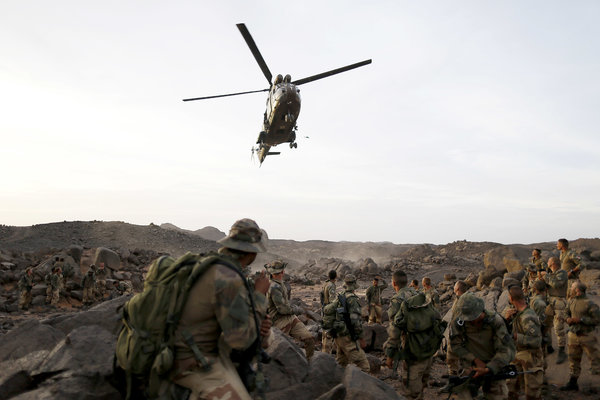
The French did God's work in Mali: cleared out the nutcases who went medieval on the north during their year of ruling dangerously.
But with the "clear" comes responsibility to "hold" (nay, even to "build") and now the locals naturally fear the return of the AQIM-affiliated types who imposed their version of 7th-century morality over the past year or so.
With France planning to start withdrawing its troops from Mali next month, Western and African officials are increasingly concerned that the African soldiers who will be relied on to continue the campaign against militants linked to Al Qaeda there do not have the training or equipment for the job.
The heaviest fighting so far, which has driven the militants out of the towns and cities of northeastern Mali, has been borne by French and Chadian forces, more or less alone. Those forces are now mostly conducting patrols in the north, while troops sent by Mali’s other regional allies, including Nigeria and Senegal, have been slow to arrive and have focused on peacekeeping rather than combat, prompting grumbles from Chad’s president, Idriss Déby Itno.
The outcome of the fighting in Mali carries major implications not only for France, but also for the Obama administration, which is worried that Al Qaeda in the Islamic Maghreb and other militant groups could retain a smaller but enduring haven in remote mountain redoubts in the Malian desert.
To help the French, the United States began flying unarmed surveillance drones over the region last month from a new base in Niger. And the administration has spent more than $550 million over the past four years to help train and equip West African armies to fight militants so that the Pentagon would not have to. But critics contend that the United States seems to have little to show for that effort.
Turning Mali’s own fractured army into a cohesive and effective force would entail “a huge amount of work,” according to Brig. Gen. Francois Lecointre of France, who is leading the effort to retrain Mali’s Army. As if to underscore the point, a group of Malian troops briefly abandoned their posts recently and fired shots in the air to demand a deployment bonus.
Here in the southeastern corner of Mauritania, about 100 miles from the border with Mali, an exercise conducted this month by the United States military to train African armies to foil ambushes, raid militant hide-outs and win over local populations offered the administration more reasons for worry, as well as some encouraging signs.
The exercise offered a rare glimpse into the strengths and weaknesses of several of the African armies that are poised to help take over the mission in Mali. In a few weeks, the United Nations Security Council is expected to decide whether to authorize a peacekeeping force for Mali and how to compose it.
France, we are told, will leave behind a small unit of headhunters - counter-terror personnel. And then there's always America's "limited regret" drones (the gun that's settling the Gap), but we all know that this is temporizing the situation (think back to Ignatius' latest lament on the lack of a SysAdmin-like force). This is why I continue to rail (per my recent piece in Foreign Policy) against retreating to renewed fantasies of great power war as a means of denying the strategic reality still lying out there.
We can most definitely choose to low-ball our responses to such events; we just don't need to blame it on the Chinese, who are - oddly enough - most incentivized to likewise deal with such enduring instabilities.
 Africa,
Africa,  China,
China,  Long War,
Long War,  US foreign policy | in
US foreign policy | in  Citation Post |
Citation Post |  Email Article |
Email Article |  Permalink |
Permalink |  Print Article
Print Article Going home
 Friday, March 15, 2013 at 11:15PM
Friday, March 15, 2013 at 11:15PM 
I was born in Calumet county (just to the right of Lake Winnebago and just below Brown/Green Bay), but grew up almost entirely in Grant (where Wisconsin river feeds into Mississippi). Then four years in Dane at the U of Wisconsin. Met spouse there, cooking at a restaurant where she was waitress (Frankie and Johnny were sweethearts ...).
Then 6 years in Massachussets (Harvard), then a year in Maryland (West Baltimore, aka "The Wire").
Then seven years in northern VA (Fairfax county). Two babies born.
Then seven years on Aquidneck Island in Rhode Island. One baby born, and one adopted (China).
And now 8 years done in Indiana (Johnson County - just below Marion/Indianapolis). Two sisters adopted (Ethiopia).
Today I secured a home in Madison Wisconsin. Son had gotten in for next year, and wife successful transferred into grad school there (going for her second masters after a BA there in journalism).
We're even going back to the parish where Vonne and I were married.
All very nostalgic.
I don't expect leave Wisconsin again, but my history with Vonne says otherwise. I do want to learn the Greak Lakes like the back of my hand.
And see lotsa more Packer games than my usual Gold Package duo.
But frankly, I'm personally going - by far - to escape the allergies here in Indiana. On average, I am sick (by anyone's kind definition) about 300 days a year here. Anywhere else I go in this world, I feel instantly better, but here, every morning is like the worst hangover from college (and I don't hardly drink any more!).
So I am hoping for a great life improvement.
This morning in Madison I awoke after 7 hours of sleep two minutes before the alarm. Until 2005, this was my life - like clockwork. I look forward to regaining that lifestyle and health - and that extra hour of sleep in the CST (my theory for crabby Easterners).
I can't wait to get back out in a canoe on Wisconsin's many fine rivers. I will paddle them all.
My non-too-secret plan: get filthy rich, become Wisconsin's most beloved philanthropist, forcing Green Bay Packers to name me to the Exec Committee, and then kiss my Super Bowl ring just before I close my eyes the last time - dying anywhere but on this planet.
Not sure I can talk Vonne into that last bit, but I have a plan for that too (two words . . . interplanetary adoption).
The four stages of Putinism
 Thursday, March 14, 2013 at 12:23PM
Thursday, March 14, 2013 at 12:23PM Wikistrat is currently running a simulation on "When Putin Falls." It's not a prediction, per se, but an exploration of a pathway in which Putin does not finish out his current six-year term.

With that in mind, check out "The four stages of Putinism," by Andrei Piontkovsky at the Hudson Institute.
They are:
- Creating the legitimizing myth
- Period of storms and stresses
- Heroic triumph
- Ideological exhaustion and death
In my mind, Putinism was an inevitable rightist-surge following the opening-up under Yelstin (too chaotic). It set the ship of state on a steadier course but it has not knowledge of how to rule - only how to build and consolidate rule (the siloviki).
What is hopefully next is the permanent normalization of politics post-Putin. He can facilitate that in a graceful way, but one is tempted to say that's unlikely.
Anyway, already any number of interesting scenarios posted on the sim's wiki.
If you are interested in joining Wikistrat's Analytic Community (now about 600 analysts worldwide), contact me at thomaspmbarnett@wikistrat.com.
LockMart scores desalination breakthrough?
 Wednesday, March 13, 2013 at 12:26PM
Wednesday, March 13, 2013 at 12:26PM
Fascinating to me, and to have a defense contractor to boot!
HT to Jim Henkenius.
Gist of short notice:
A defense contractor better known for building jet fighters and lethal missiles says it has found a way to slash the amount of energy needed to remove salt from seawater, potentially making it vastly cheaper to produce clean water at a time when scarcity has become a global security issue.

Why this matters so much: check out the NYT story on India's growing water woes.
That people in one of the rainiest places on the planet struggle to get potable water is emblematic of the profound water challenges that India faces. Every year, about 600,000 Indian children die because of diarrhea orpneumonia, often caused by toxic water and poor hygiene, according to Unicef.
Half of the water supply in rural areas, where 70 percent of India’s population lives, is routinely contaminated with toxic bacteria. Employment in manufacturing in India has declined in recent years, and a prime reason may be the difficulty companies face getting water.
And India’s water problems are likely to worsen. A report that McKinsey & Company helped to write predicted that India would need to double its water-generation capacity by the year 2030 to meet the demands of its surging population.
A separate analysis concluded that groundwater supplies in many of India’s cities — including Delhi, Mumbai, Hyderabad and Chennai — are declining at such a rapid rate that they may run dry within a few years.
The water situation in Gurgaon, the new mega-city south of Delhi, became so acute last year that a judge ordered a halt to new construction until projects could prove they were using recycled water instead of groundwater.
It's an old story: nobody really prioritizes the innovation until the national security tag gets slapped on - amidst a general defense budget slowdown. Then voila! Big player comes through.
The SysAdmin was meant to be "light"
 Tuesday, March 12, 2013 at 9:34AM
Tuesday, March 12, 2013 at 9:34AM 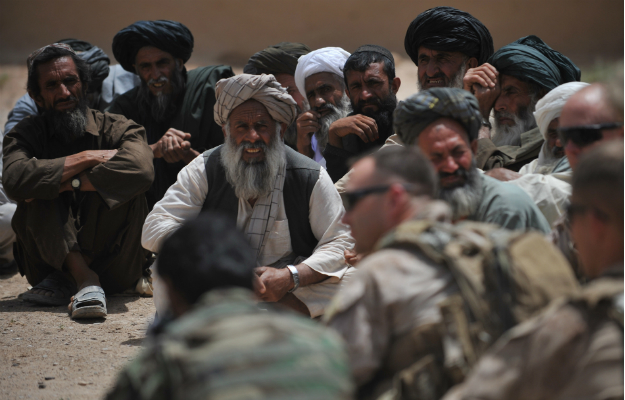 Nice piece in Foreign Policy about what it takes to do nation-building on a light footprint. Title is, "Wanted: Ph.D.s Who Can Win a Bar Fight." Reminds me of my "Pistol Packing Peace Corps" line from Blueprint.
Nice piece in Foreign Policy about what it takes to do nation-building on a light footprint. Title is, "Wanted: Ph.D.s Who Can Win a Bar Fight." Reminds me of my "Pistol Packing Peace Corps" line from Blueprint.
The start:
Looming budget cuts, ground forces worn down by years of repeated deployments, and a range of ever evolving security challenges from Mali to Libya and Yemen are quickly making "light footprint" military interventions a central part of American strategy. Instead of "nation building" with large, traditional military formations, civilian policymakers are increasingly opting for a discrete combination of air power, special operators, intelligence agents, indigenous armed groups, and contractors, often leveraging relationships with allies and enabling partner militaries to take more active roles.
Despite the relative appeal of these less costly forms of military intervention, the light footprint is no panacea. Like any policy option, the strategy has risks, costs and benefits that make it ideally suited for certain security challenges and disastrous for others. Moreover, recent media coverage of drone strikes and SEAL raids may also distort public perceptions, creating a bin Laden effect -- the notion of military action as sterile, instantaneous, and pinprick accurate. Yet nighttime raids are only the proverbial tip of the iceberg: the most visible part of a deeper, longer-term strategy that takes many years to develop, cannot be grown after a crisis, and relies heavily on human intelligence networks, the training of local security forces, and close collaboration with diplomats and development workers. For these smaller-scale interventions to be an effective instrument of national policy, civilian and military leaders at all levels should make a concerted effort to understand not only their strategic uses and limitations, but also the ways the current defense bureaucracy can undermine their success.
The most critical resource requirement in smaller interventions is human capital: talented, adaptable professionals who are not only fluent in language, culture, politics, and interpersonal relationships, but also willing to deploy for long periods and operate with little guidance. Smaller-scale missions mean less redundancy, less room for error, and more responsibility for every person in the field.
Worth reading. Guy relates his own experiences in field.
Then the depressing ending:
The looming defense budget cuts only complicate matters, as they are likely to greatly intensify the Pentagon's natural institutional tendency to protect large, high-tech, expensive programs, while "squishy," esoteric programs such as language lessons, culture immersion, broadening experiences, advanced education, advisory units, and other human capital investments -- all invaluable to smaller missions -- have little hope of being prioritized. Without a concerted, sustained effort by military and civilian leaders at all levels, the state of affairs within the defense establishment may come to resemble the parable of the blind men and the elephant, with doctrine writers, strategists, operators, and budget analysts all drawing different lessons from the past decade of war and telling a different story about how the institution should change to remain relevant. Unless speeches and policy documents are backed up by culture, processes, doctrine, and strategic clarity, the light footprint will likely remain a niche capability confined to a few fringe military units, not an effective instrument of national policy.
Sad but true. We prefer our toys.
The elder entitlement conundrum: raising retirement age doesn't get you what you want
 Monday, March 11, 2013 at 10:08AM
Monday, March 11, 2013 at 10:08AM To me, this is the ideological conflict of the 21st century: money = access to bio revolution = longer lives, so access to tech is self-licking ice-cream cone (I live longer and therefore vote more and - BTW - have more money to spend on politics, which increases my access to tech, which makes me live longer, which ...).
Check it out from WAPO:
ST. JOHNS COUNTY, Fla. — This prosperous community is the picture of the good and ever longer life — just what policymakers have in mind when they say that raising the eligibility age for Social Security and Medicare is a fair way to rein in the nation’s troublesome debt.
The county’s plentiful and well-tended golf courses teem with youthful-looking retirees. The same is true on the county’s 41 miles of Atlantic Ocean beaches, abundant tennis courts and extensive network of biking and hiking trails.
The healthy lifestyles pay off. Women here can expect to live to be nearly 83, four years longer than they did just two decades earlier, according to research at the University of Washington. Male life expectancy is more than 78 years, six years longer than two decades ago.
But in neighboring Putnam County, life is neither as idyllic nor as long.
Incomes and housing values are about half what they are in St. Johns. And life expectancy in Putnam has barely budged since 1989, rising less than a year for women to just over 78. Meanwhile, it has crept up by a year and a half for men, who can expect to live to be just over 71, seven years less than the men living a few miles away in St. Johns.
The widening gap in life expectancy between these two adjacent Florida counties reflects perhaps the starkest outcome of the nation’s growing economic inequality: Even as the nation’s life expectancy has marched steadily upward, reaching 78.5 years in 2009, a growing body of research shows that those gains are going mostly to those at the upper end of the income ladder.
The tightening economic connection to longevity has profound implications for the simmering debate about trimming the nation’s entitlement programs. Citing rising life expectancy, influential voices including the Simpson-Bowles deficit reduction commission, the Business Roundtable and lawmakers on both sides of the aisle have argued that it makes sense to raise the eligibility age for Social Security and Medicare.
But raising the eligibility ages — currently 65 for Medicare and moving toward 67 for full Social Security benefits — would mean fewer benefits for lower-income workers, who typically die younger than those who make more.
“People who are shorter-lived tend to make less, which means that if you raise the retirement age, low-income populations would be subsidizing the lives of higher-income people,” said Maya Rockeymoore, president and chief executive of Global Policy Solutions, a public policy consultancy. “Whenever I hear a policymaker say people are living longer as a justification for raising the retirement age, I immediately think they don’t understand the research or, worse, they are willfully ignoring what the data say.”
So counter-intuitive: raising the age = even more disproportional burden on less weathy.
The segregation is already well underway between the long- and short-lived.
The two counties in FLA:

Now globally:
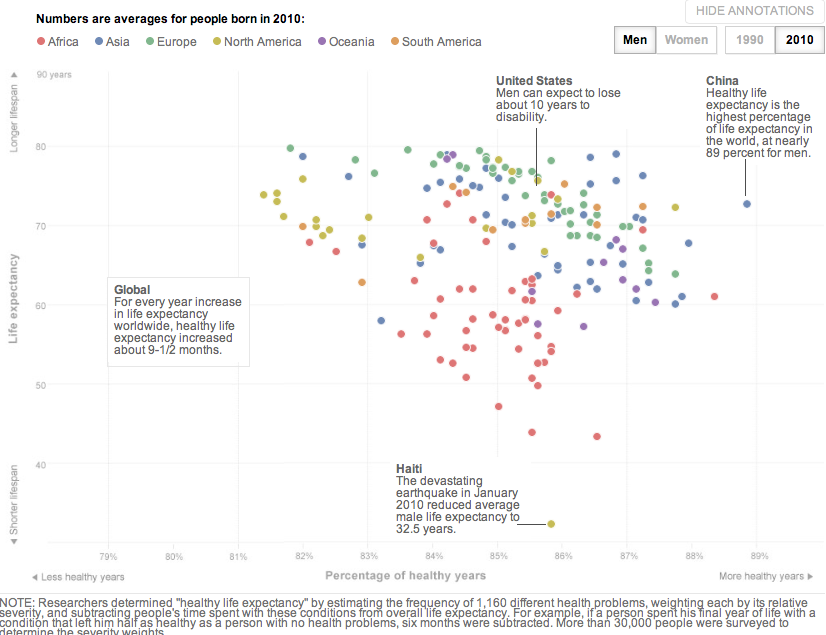
It won't be the "clash of civilizations" in the 21st century, but the clash of generations.
 US,
US,  demographics,
demographics,  global trends | in
global trends | in  Citation Post |
Citation Post |  Email Article |
Email Article |  Permalink |
Permalink |  Print Article
Print Article Censorship of tweets/microblog posts in China
 Friday, March 8, 2013 at 9:39AM
Friday, March 8, 2013 at 9:39AM 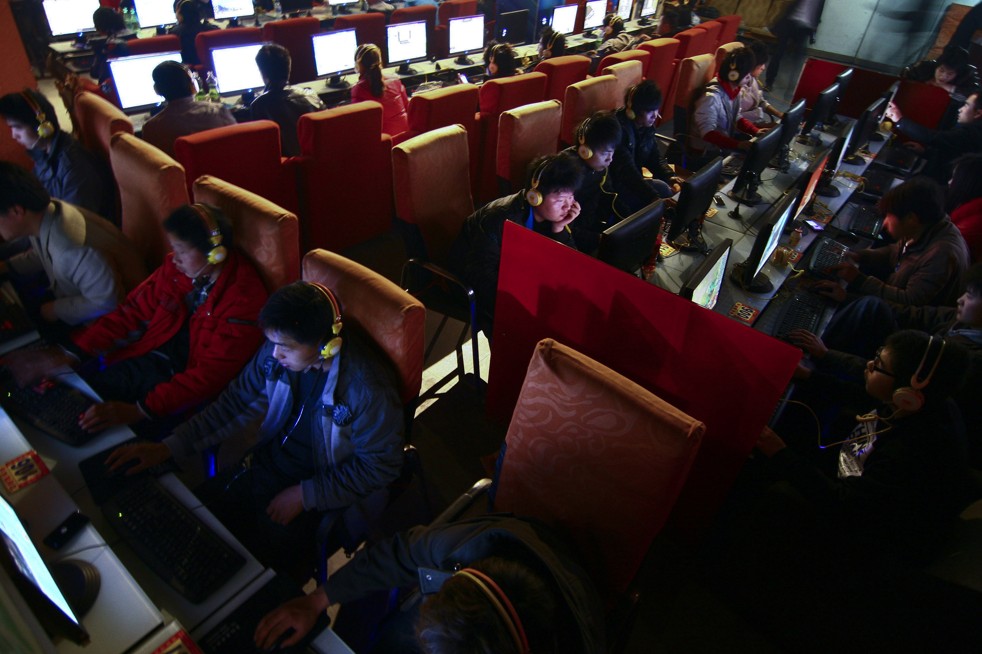 WAPO article on Rice U. study (richly detailed and seemingly very robust in data capture and analysis on how the Chinese gov deletes micro-blog posts).
WAPO article on Rice U. study (richly detailed and seemingly very robust in data capture and analysis on how the Chinese gov deletes micro-blog posts).
First point article makes is that China's flow of tweets is several times that of Twitter, so we're talking massive amount. It seems gov cuts about 12% of them.
Here are the envisioned procedures:
Explicit filtering: a banned keyword triggers an automated system, which stops the message from posting and warns the user he has violated policy. Implicit filtering: a banned keyword triggers an automated system, which delays the message until a censor can see it and tells the user there’s a server error in the meantime. Camouflaged posts: a banned keyword triggers an automated system, which keeps the message from displaying publicly but shows the user it has posted. Backwards repost search: either a human censor or an automated system discovers a problematic posts and deletes all versions of it (re-posts, etc.) across the network. Backwards keyword search: a censor notices a problematic keyword and deletes a number of its instances across the network. User monitoring: certain users who are censored frequently are flagged for closer scrutiny. Account closures: censors shut down problematic accounts entirely. The study counted 300 such closures of 3,500 accounts in a one-month period. Search filtering: a regularly updated list of terms cannot be searched. Public timeline filtering: sensitive topics are edited out of the general Weibo “fire hose.”
While we may celebrate the technical achievement (most posts killed in less than 10 minutes), we must remember the tremendous effort required and the larger reality that banned conversations occur all the time. All the government succeeds in doing is clamping down on public transmission.
The topics show how defensive the government is - from the geostrategic to the completely mundane:
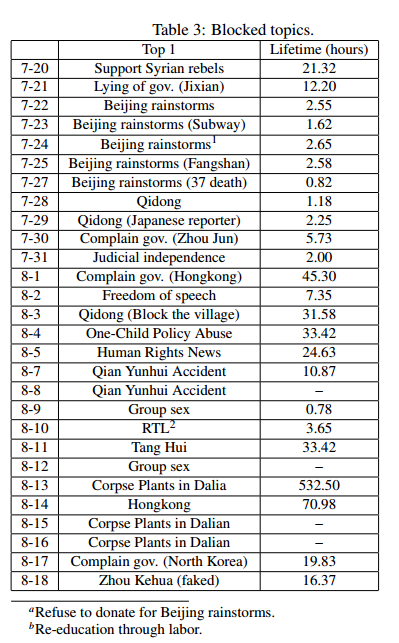 Okay, so Syria trends one day and then gov corruption comes next, but then look at the rainstorms cluster, because that's just people bitching about how poorly the gov responded to the frickin' rain! I mean, that is sad.
Okay, so Syria trends one day and then gov corruption comes next, but then look at the rainstorms cluster, because that's just people bitching about how poorly the gov responded to the frickin' rain! I mean, that is sad.
What's sad about this effort is that the gov does seek to respond on some level to these issues, so it listens. It just can't allow that listening or response process to be acknowledged - much less the initial bitching.
You may spot strength in that, or some BS about the "Chinese way of governance" and so forth, but all that fades away as the Chinese people modernize their society and exhibit more and more competence in running their own daily lives, businesses, and the larger society itself.
By engaging in all this clamping down of speech, all the government does is signal that it's not to be held responsible for its failures, and that determination blocks the naturally positive expansion of nationalism in the direction of societal self-improvement, meaning the gov is making itself less stable and thus more brittle over time by refusing to respect its own people and their righteous complaints.
In historical terms, this is spitting in the wind and wondering why there always seems to be saliva in one's eyes. The government is simply refusing to converse with a public that is becoming more self-deterministic - through economic success - with each passing day.
Again, there is no singular Chinese/Asian path in this regard. The same breakdown of the collective mindset that happened in the West happens in the East. Modernization/industrialization is simply that powerful.
 China,
China,  development,
development,  technology | in
technology | in  Citation Post |
Citation Post |  Email Article |
Email Article |  Permalink |
Permalink |  Print Article
Print Article Chavismo in charts (WAPO)
 Thursday, March 7, 2013 at 9:32AM
Thursday, March 7, 2013 at 9:32AM Great article that seeks to explain successes and failures of Huge Chavez in charts.
Here they are the four that attracted my attention, as they represent judgment by peers (and not the US):
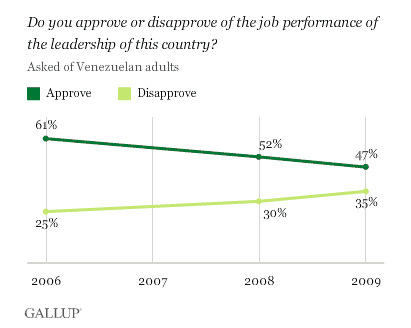
So he was clearly slipping inside the country, although his strong-arm populism still captured about half the population.
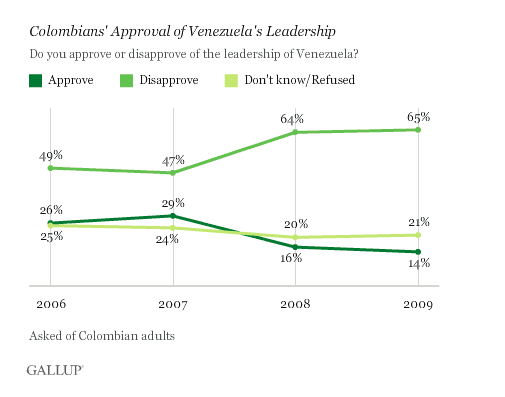
Colombia is where Chavez did his most meddling: supporting insurgents and setting up his regime as a trans-shipper of narcotics into North America. Clearly no love-loss there.
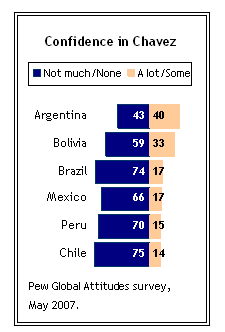
The countries where the middle class is growing (and Bolivia - considered in the Chavismo camp). Even in Bolivia, 60% don't have any real confidence in the man. The continent's real players, Brazil and Chile, clearly wanted nothing to do with the man - whatever false praise was heaped on him by Brasilia.
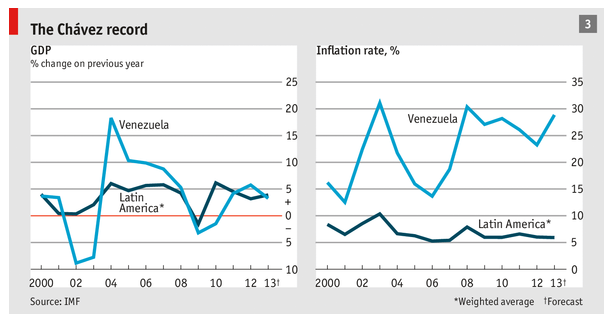
The economic record indicates a moment of Putinesque "brilliance" afforded by high energy prices mid-decade, and then run-of-the-mill performance during which antipathy grows within the country regarding his heavy-handedness - only natural. The big failure was on inflation, the long-time scourge of the region. Stunning failure there that represented his tendency to "eat the seed corn." That's the truly painful legacy: Chavez ran down the oil industry and it'll take a while to get it back to its true potential.
So a good show, but no more lasting impact that any previous populist demagogue and strong-man.
Time's Battleland: MILITARY Pentagon Malady: “Next-War-Itis”
 Wednesday, March 6, 2013 at 11:40AM
Wednesday, March 6, 2013 at 11:40AM

I was approached by Foreign Policy magazine back in January to pen one of their “Think Again” columns, this one focusing on the future of war.
Read the entire post at Time's Battleland.

The future of social work (youth services)
 Tuesday, March 5, 2013 at 8:17AM
Tuesday, March 5, 2013 at 8:17AM 
Fascinating NYT story on how police precincts in NYC are moving "left of boom" (as the military says) to intervene with vulnerable youth BEFORE they even get involved with the gangs, etc.
The strategy:
The New York City Police Departmenthas embarked on a novel approach to deter juvenile robbers, essentially staging interventions and force-feeding outreach in an effort to stem a tide of robberies by dissuading those most likely to commit them.
Officers not only make repeated drop-ins at homes and schools, but they also drive up to the teenagers in the streets, shouting out friendly hellos, in front of their friends. The force’s Intelligence Division also deciphers each teenager’s street name and gang affiliation. Detectives compile a binder on each teenager that includes photos from Facebook and arrest photos of the teenager’s associates, not unlike the flow charts generated by law enforcement officials to track organized crime.
The idea, in part, is to isolate these teenagers from the peers with whom they commit crimes — to make them radioactive.
This is a form of "big data" intervention: based on trajectories, the cops know who's highly likely to be sucked into certain activities. Their names start appearing on police blotters - often on "both sides" (victim and perpetrator). The cops also know where and when the activity is likely to occur.
So they just start showing up, making it clear they know you and where you're headed.
Tell me that's not just aggressive social work. The signs are all there. The initial indicators are piling up. You know who, what, where, when and why. Question is, do you just wait with this information or do you act pre-emptively?
The whole linking-the-dots thing about 9/11 has many parallels in other security domains, with obvious overlaps in medical, environmental, etc.
This is where "big data" will take governance.
This is where we will locate the looming Progressive Era.
Same things holds on bad actors internationally.
Yes, we can resort to old labels and call it many names. Or we can grow up and understand that we can and will do better.
Writing off vulnerable populations isn't noble. It's merely shirking your civic/global duty.
Foreign Policy: Think Again: The Pentagon (The military's Chicken Littles want you to think the sky is falling. Don't believe them: America has never been safer.)
 Monday, March 4, 2013 at 12:01AM
Monday, March 4, 2013 at 12:01AM 
MARCH/APRIL ISSUE
BY THOMAS P.M. BARNETT
"The Pentagon Is Always Fighting the Last War."
Just the opposite. The Pentagon, as former U.S. Defense Secretary Robert Gates derisively pointed out, has a bad case of "next-war-itis." With Iraq now ancient history and Afghanistan winding down, all four of the major U.S. military services today prefer to imagine distant, future, high-tech shoot-'em-ups against China (er, well-equipped adversaries) over dealing with the world as we find it, which is still full of those nasty little wars. As Marine Corps general and outgoing Central Command boss James Mattis once told me, "I find it intellectually embarrassing that people want to hug the Chinese [and exclaim], 'Oh, thank God we have another peer competitor at last! Now we can go back to building the weapons that we always wanted to build.'"
Read the entire article at Foreign Policy.










